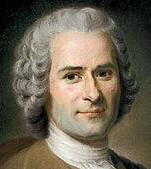Jean Jacques
Rousseau Jean-Jacques Rousseau (1712-1778) was a Genevan philosopher, writer, and composer of 18th-century Romanticism of French expression. His political philosophy influenced the French Revolution as well as the overall development of modern political, sociological and educational thought. Rousseau ranked emotional development and experience above book learning. That need, impulse and will precede intellect and argument. That people did not live by reason alone -- they had feelings, passions, fears, and prejudices He works influenced the new age called Romanticism, where science and theology was displaced by a vivid synthesis of art, religion, and individual consciousness. In ‘The Confession of Faith of a Priest from Savoy’, Rousseau shifted the ground of discussion away from physics and psychology and made the knowledge of God rest on man's religious impulse. The inner consciousness of morality and love of God is first a feeling, later aided by reason. Rousseau’s writings set Kant on the track of the “practical reason,” which renewed piety. When Sir Isaac Newton published his Principia Mathematica (1687) European worldview (naively) changed to the spectacle of a mindless universe in which automata mechanically pursue a meaningless existence. The truths of theology – God, free will, or immortality - belong not to pure reason but to practical reason. It was in ‘The Critique of Pure Reason’ (1781) that Kant opened the way out of skepticism, renewed the possibility of religion and moralism. The popular phrase from Rousseau’s 'The Social Contract' (1762), “Man is born free and lives forever in chains”, inspired many of the political reforms and revolutions of 18th century Europe, especially in France. To this day Rousseau's intention and philosophy are matters of debate. The clichés about his views stand in the way of what he plainly said. For example, he did not say "Back to Nature!" nor did he want men to return to innocent (or noble) savagery. Much of what we do today, how we dress and talk and act in our present democratic love of the simple and casual is Rousseau in action. Likewise our feeling for nature, our appetite for greenery and holidays in the woods, our need of an antidote to the city -- all are emotions given worth and form for the first time in Rousseau's work. The key to understanding the modern age:
conflict of reason and feelings. An abstract, regular, and utilitarian model of society does not suit wayward man;
he is diverse and irrational in his impulses, traditions, and faiths.
z |
